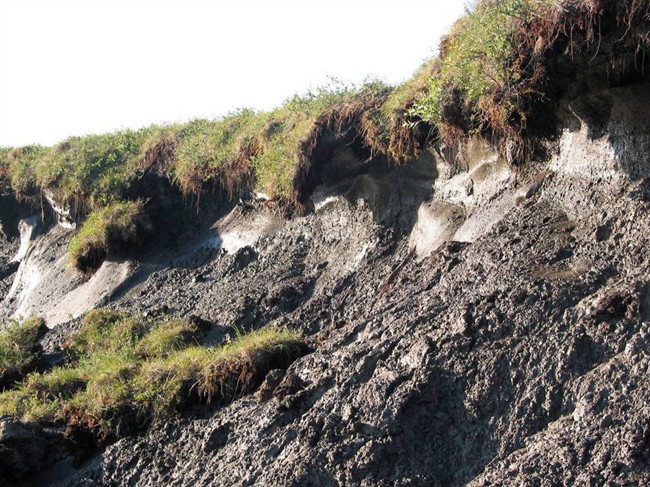Permafrost in some areas of the Canadian Arctic is melting so fast that it’s gulping up the equipment left there to study it.

“The ground thaws and swallows it,” said Merritt Turetsky, a University of Guelph biologist whose new research warns the rapid melt could dramatically increase the amount of greenhouse gases released from ancient plants and animals frozen within the tundra.
READ MORE: Ontario government introduces legislation to curb illegal soil dumping
“We’ve put cameras in the ground, we’ve put temperature equipment in the ground, and it gets flooded. It often happens so fast we can’t get out there and rescue it.
“We’ve lost dozens of field sites. We were collecting data on a forest and all of a sudden it’s a lake.”
Turetsky’s research, published this week in the journal Nature, looks at the rate of permafrost melt across the Arctic and what its impact could be on attempts to limit greenhouse gas emissions that cause climate change.
It’s been known for years that the vast belts of frozen soil that underlie much of the North are thawing as the Arctic warms. That releases greenhouse gases as organic carbon from plants and animals, once locked away in the ice, melts and decomposes.
WATCH: Pushed by climate change: Lake in Northwest Territories falls off cliff
Climate scientists have assumed a slow, steady erosion of permafrost and a similar pace of carbon release. Turetsky and her colleagues found something different.

Get daily National news
Instead of a few centimetres of melt a year, several metres of soil can destabilize within days. Landscapes collapse into sinkholes. Hillsides slide away to expose deep permafrost that would otherwise have remained insulated.
READ MORE: Arctic’s melting permafrost could cost the global economy nearly $70 trillion: study
“Permafrost at (that) depth, even one hundred years from now, probably would still be protected in the soil,” she said. “Except here comes this really crazy liquefication where this abrupt thaw really churns up this stuff.”
Wildfires, becoming larger and hotter every year over the Canadian boreal forest, are also causing rapid permafrost melt.
WATCH: Researchers gather to study lingering effects of wildfire smoke

Nearly one-fifth of Arctic permafrost is now vulnerable to rapid warming, Turetsky’s paper suggests. Plenty of it is in Canada, such as in the lowlands south of Hudson Bay.
Soil analysis found those quickly melting areas also contain the most carbon. Nearly 80 per cent of them hold at least 70 kilograms of carbon per cubic metre.
That suggests permafrost is likely to release up to 50 per cent more greenhouse gases than climate scientists have believed. As well, much of it will be released as methane, which is about 30 per cent more efficient at trapping heat than carbon dioxide.
“These are minimum estimates,” Turetsky said. “We’ve been very conservative.”
READ MORE: Climate change to cause more damage to Canada’s northern roads than previously feared: study
Despite the rapid melt, it’ll be decades before the extra carbon release starts to influence global climate. “We’ve got a bit of time.”
The abrupt collapsing of permafrost, however, will affect northerners long before that.
“The landscape is going to be affected more and more every year by permafrost degradation,” Turetsky said.
“We’ve got a lot of people living on top of permafrost and building infrastructure on top of permafrost. It’s enough to sink northern budgets.”
WATCH: Report: Climate change on fast-forward in Canada




Comments
Want to discuss? Please read our Commenting Policy first.